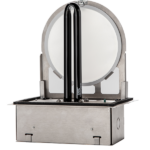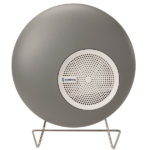One of the common themes you may start to see here on the Synexis Blog is that we prioritize so many aspects of health while not thinking about what the impact of indoor air quality (IAQ) might be. Because of that, even with psychological issues becoming more top of mind for healthcare professionals, we often forget about the impact that poor indoor air quality can have on mental health. The air we breathe everywhere can impact our mental health, yet the influence remains underestimated.
May is Mental Health Awareness Month, so we want to dig into the relationship between poor indoor air quality and mental health.

The Invisible Threat: Understanding Indoor Air Quality
You probably at least have some awareness about the importance of improving both IAQ and Indoor Environmental Quality (IEQ). We know indoor environments can be full of invisible pollutants. These include mold, Volatile Organic Compounds (VOCs), and other allergens. Prolonged exposure to these pollutants can wreak havoc on our mental well-being and contribute to a wide range of psychological symptoms.
The Impact of Indoor Air Quality on Mental Health
- Anxiety and Stress: Poor IAQ has been linked to increased level of both anxiety and stress. In an era where both of these mental health issues have increased in recent years, we don’t need another contributor. Exposure to pollutants has been shown to increase oxidative stress and cytokine production in the brain. Essentially, they help to release stress hormones such as cortisol. That means that those exposed to high levels of pollutants indoors may experience heightened feelings of tension and apprehension, exacerbating anxiety disorders.
- Depression: Much of the research linked above also suggests a correlation between poor IAQ and depression. That makes sense with anxiety and stress linked with depression as well. Inhalation of certain pollutants can disrupt neurotransmitter function in the brain, which impacts mood regulation and emotional stability.
- Cognitive Impairment: Our cognitive abilities aren’t immune to the effects of poor IAQ. Emerging studies have shown that exposure to air pollution, both indoors and out, may be associated with cognitive impairment. The effects reportedly range from impaired neurocognitive development in infancy and childhood to higher rates of cognitive decline and dementia later in life.
- Sleep Disturbances: The quality of our indoor air can directly impact our quality of sleep. A lack of sleep and general poor quality of sleep has been linked with depression, suicide, and risk-taking behavior.

Strategies to Promote Better IAQ and Mental Health
Addressing the issue of poor indoor air quality requires an effort from everyone. This includes individuals, policymakers, building managers, and anyone associated with any indoor space. Implementing effective ventilation systems, regular maintenance protocols and an air purification system like Synexis provides with patented Dry Hydrogen Peroxide (DHP®) technology can help mitigate those indoor pollutants’ presence. Raising awareness about IAQ’s importance and impact on mental health is crucial in promoting healthier indoor environments. The air we breathe is intricately intertwined with mental well-being. From anxiety and depression to cognitive impairment and sleep disturbances, poor IAQ can be impactful in so many areas. This casts a shadow over our psychological health. A prioritization of IAQ initiatives and adopting proactive measures to improve indoor air quality will help to create environments that nurture both physical and mental health. Because in the pursuit of happiness, every breath counts. To speak with an IAQ expert from Synexis, fill out this form and we’ll contact you as soon as possible. And to learn more about Synexis, click here.

















